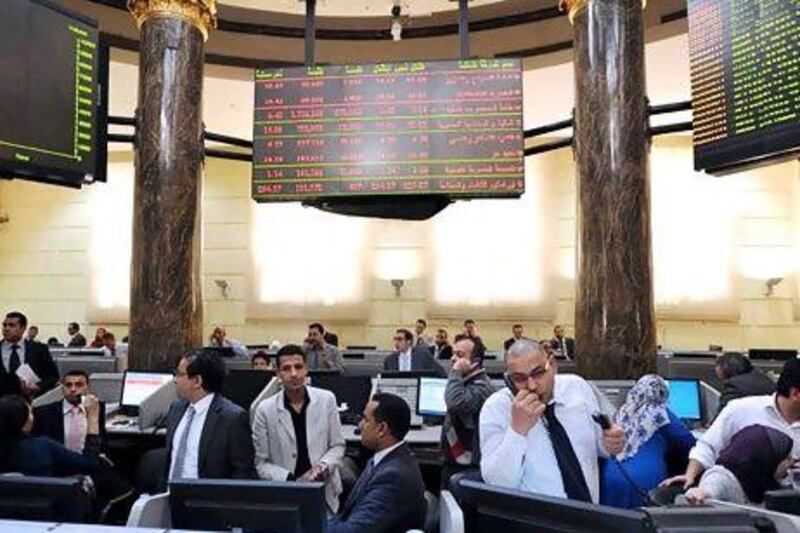Political uncertainty is threatening to weigh on Egypt's stock market this week.
Trading has slowed since the Muslim Brotherhood's decision to push one of its senior leaders, Khairat Al Shater, for the presidency, reversing an earlier pledge to stay out of the race.
The EGX 30 Index has rallied as much as 51 per cent this year amid expectations that the worst was over as the country made steps towards political development more than a year after the revolution that toppled Hosni Mubarak from the presidency.
"If we have some bad news from the political arena, it could definitely impact the market," said Sebastien Henin, a portfolio manager at The National Investor in Abu Dhabi. "Economic figures are also not very good, with less than three months of foreign reserves to cover imports, reaching dangerous levels."
A US$3.2 billion IMF loan needed to overcome a staggering economy became the subject of political haggling last week between the Muslim Brotherhood and the country's interim military rulers. The loan may now be delayed until June.
Egypt needs $11bn of financing in two years, the finance minister, Momtaz El Saieed, has said.
"The deal is not done, and we know it's not big enough," Mr Henin said. "On top of the economic and political situation, there are uncertainties as well at the corporate level."
News reports quoted Algeria's finance minister as saying that negotiations with Orascom Telecom's parent company, Vimplecom, could take "months" because of a price disagreement for a 51 per cent stake in the Algerian mobile phone subsidiary Djezzy.
Orascom Telecom shares fell 7 per cent on Wednesday and 4 per cent on Thursday, closing at 3.40 Egyptian pounds. The EGX 30 Index fell 0.2 per cent in the same period, closing at 4,827.02.
"OT has been dragging the whole market with it," said Wafik Dawood, the head of institutional sales at Mega Investments Securities in Cairo. "OT's 96 per cent rise this year was mainly driven by speculation that the Algerian conflict is coming to an end and that as soon as the valuation is out, the deal will go through. But now we are back to square one."
Several companies are expected to pay dividends this week.
Ahli United Bank has announced that on Wednesday it will issue to investors three shares for every one they hold.
National Société Générale Bank said it would pay a cash dividend of 1.25 Egyptian pounds per share on Wednesday.
Telecom Egypt, which has a monopoly in fixed-line telephone services in the country, has announced it will pay shareholders 1.10 pounds per share on Wednesday.
Global markets this week will have to grapple with US job numbers that were released on Friday and fell short of expectations. Only 120,000 jobs were added last month, far below the estimate of 203,000 jobs. US and European financial markets were closed on Friday to observe Easter.
The S&P 500 futures fell 1.2 per cent to 1,374, suggesting a weak opening tomorrow, Reuters reported. Nasdaq 100 futures dropped 1.1 per cent to 2,722.50. Dow futures dropped 1.1 per cent to 12,841.
UAE stock markets finished lower last week. The Dubai Financial Market General Index was down 0.9 per cent to 1,686.50 on Thursday. The Abu Dhabi Securities Exchange General Index slipped 0.1 per cent to 2,558.98.
Elsewhere in the region, Kuwait's measure fell 0.2 per cent to 6,145.50, Bahrain's was little changed at 1,141.25, Oman's MSM 30 Index closed 0.3 per cent higher at 5,827.19, and Qatar's QE Index slipped 0.2 per cent to 8,825.18. The Saudi Tadawul All-Share Index closed down 0.42 per cent at 7,862.51 yesterday.
halsayegh@thenational.ae
twitter: Follow our breaking business news and retweet to your followers. Follow us
An uncertain week looms for Egypt stock markets
Political uncertainty is threatening to weigh on Egypt's stock market and several companies are expected to pay dividends.

Editor's picks
More from the national




